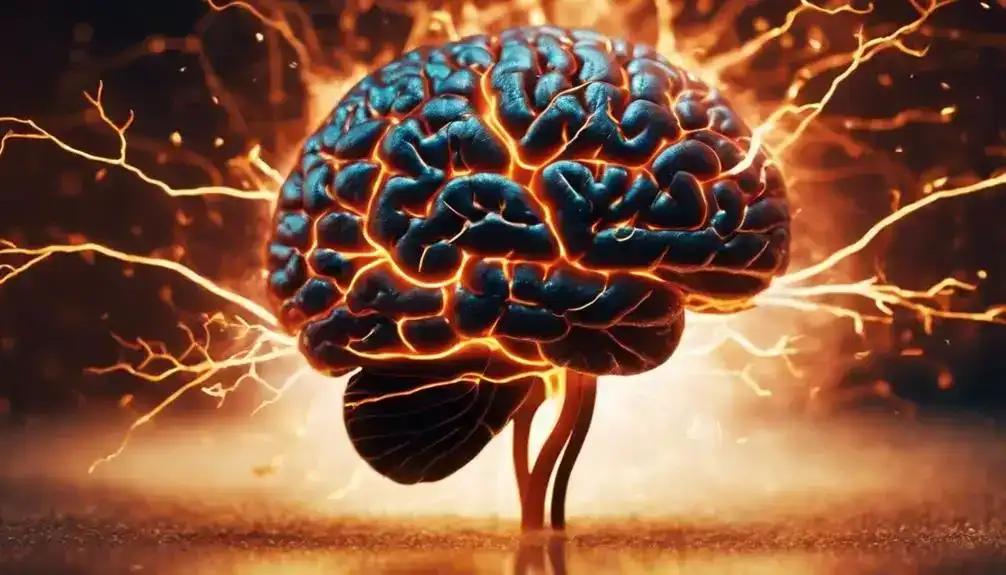When you drink coffee, the caffeine acts as a stimulant, impacting your stress response, potentially worsening anxiety. caffeine blocks adenosine receptors in your brain, leading to heightened anxiety symptoms. It affects neurotransmitter release, impacting mood regulation and stress responses.
Genetic factors play a role in how your body processes caffeine, influencing anxiety susceptibility. Higher caffeine doses intensify anxiety symptoms, with over 400 mg per day potentially causing issues. Understanding these processes sheds light on how caffeine in coffee can fuel your stress and anxiety.
Understanding Caffeine in Coffee and Its Effects on Anxiety
Understanding how caffeine in coffee impacts anxiety involves examining its stimulant properties and physiological effects on the body. Anxiety triggers can be amplified by caffeine due to its ability to increase heart rate and mimic symptoms of anxiety.
Coping mechanisms are essential for individuals sensitive to caffeine-induced anxiety. caffeine metabolism varies among individuals, with genetic predisposition playing a significant role in how caffeine affects anxiety levels. Those with variations in genes related to adenosine receptors and caffeine metabolism may be more susceptible to heightened anxiety from coffee consumption.
Recognizing these factors can aid in developing personalized strategies for managing anxiety triggered by caffeine in coffee.
How Do the stimulant effects of Caffeine in Coffee Impact Anxiety?
caffeine’s impact on the brain involves blocking adenosine receptors, which results in increased alertness and reduced drowsiness. This mechanism can lead to heightened anxiety symptoms by stimulating the release of neurotransmitters like dopamine, noradrenaline, and glutamate, which play a role in mood regulation and stress responses.
understanding how caffeine influences these brain processes is crucial in comprehending its effects on anxiety levels.
How Caffeine in Coffee Affects the Brain?
Furthermore, caffeine in coffee impacts the brain by blocking adenosine receptors, which typically induce drowsiness, leading to increased alertness.
Additionally, caffeine raises levels of dopamine, noradrenaline, and glutamate, enhancing mood and energy but potentially contributing to anxiety symptoms.
Furthermore, the heightened neurotransmitter levels can elevate blood pressure and heart rate, further exacerbating feelings of anxiety and restlessness.
Blocking Adenosine Receptors
Blocking adenosine receptors alters the brain’s response to caffeine in coffee, leading to increased alertness and potential overstimulation. Adenosine receptors, typically responsible for signaling relaxation and drowsiness, are blocked by caffeine.
This interference prevents the brain from recognizing the need for rest, resulting in heightened wakefulness. Understanding this mechanism sheds light on how caffeine’s stimulant effects can impact anxiety levels in individuals sensitive to its influence.
Increasing Dopamine, Noradrenaline, and Glutamate Levels
The stimulant effects of coffee on the brain involve an increase in levels of dopamine, noradrenaline, and glutamate, which can impact anxiety symptoms.
These neurotransmitter effects play an important role in mood regulation and can influence your overall sense of well-being.
understanding how caffeine alters these chemical messengers is essential in comprehending its effects on your mental state and anxiety levels.
Impact on Blood Pressure and Heart Rate
Impact on blood pressure and heart rate from the stimulant effects of caffeine in coffee can significantly contribute to feelings of anxiety and restlessness.
The increased levels of neurotransmitters like dopamine and noradrenaline can elevate blood pressure and heart rate, impacting stress levels.
These physiological changes may disrupt sleep quality and worsen anxiety symptoms.
Understanding this relationship can aid in managing caffeine addiction and seeking anxiety relief strategies.
How Does Genetic Sensitivity to Caffeine in Coffee Influence Anxiety?
Genetic factors play a vital role in determining your sensitivity to caffeine in coffee, impacting how your body metabolizes this stimulant.
Variations in genes related to adenosine receptors and caffeine metabolism can make you more susceptible to the anxiogenic effects of caffeine.
Additionally, differences in metabolism rates among individuals can influence the intensity and duration of caffeine’s effects on anxiety levels.
Genetic Factors Influencing Sensitivity to Coffee Caffeine
Variations in specific genes related to adenosine receptors and caffeine metabolism can greatly impact an individual’s susceptibility to anxiety from consuming caffeine in coffee.
Genetic predisposition plays an important role in determining caffeine sensitivity, influencing how efficiently the body processes and responds to caffeine.
Certain genetic variations can lead to slower caffeine metabolism or heightened adenosine receptor activity, making individuals more prone to experiencing anxiety symptoms after coffee consumption.
understanding these genetic factors is essential in recognizing why some people are more sensitive to caffeine’s anxiogenic effects than others.
Differences in Metabolism Rates of Coffee Caffeine
the fluctuating rates at which individuals metabolize caffeine in coffee play a pivotal role in determining the intensity and duration of its effects on anxiety levels.
Genetic influences and metabolism variations have a substantial impact on how caffeine affects individuals, influencing their susceptibility to anxiety from coffee consumption.
Variations in genes related to adenosine receptors and caffeine metabolism can make some people more sensitive to the anxiogenic effects of caffeine.
Differences in metabolism rates of coffee caffeine can lead to varying responses, with some individuals experiencing heightened anxiety due to slower metabolism, while others may process caffeine more efficiently, reducing its impact on anxiety levels.
Anxiety Disorders Linked to Caffeine in Coffee
Anxiety disorders linked to caffeine in coffee are recognized in the DSM-5, underscoring the significant impact of caffeine on mental health.
Overlapping symptoms between coffee caffeine use and anxiety disorders can complicate the diagnosis process, as both conditions share common manifestations.
Understanding these connections is essential for accurately identifying and managing coffee caffeine-induced anxiety disorders.
Recognizing Coffee Caffeine-Induced Anxiety in the DSM-5
Recognizing coffee caffeine-induced anxiety in the DSM-5 involves understanding the criteria for diagnosing coffee caffeine use disorder and caffeine-induced anxiety disorder. Criteria such as a persistent desire to control caffeine use, continued consumption despite harm, and experiencing withdrawal symptoms are essential for diagnosis.
Understanding Caffeine-Induced Anxiety Disorder from Coffee
Identifying coffee caffeine-induced anxiety disorder involves understanding the intricate relationship between caffeine consumption and the development of anxiety symptoms as outlined in the DSM-5.
This disorder can be managed effectively through:
- Coping mechanisms that address stress responses.
- Behavioral therapy to modify caffeine consumption behaviors.
- Support systems to navigate anxiety triggers related to coffee intake.
Criteria for Diagnosing Coffee Caffeine Use Disorder
Understanding the criteria for diagnosing Coffee Caffeine Use Disorder is essential in recognizing the impact of caffeine consumption on mental health.
- Criteria evaluation:
- Persistent desire to control caffeine use.
- Continued use despite harm.
- Presence of withdrawal symptoms.
Intervention strategies:
- Implementing behavioral therapy.
- Gradually reducing caffeine intake.
- Monitoring and managing withdrawal symptoms.
Overlapping Symptoms of Coffee Caffeine Use and Anxiety Disorders
An overlap exists between the symptoms of coffee caffeine use and anxiety disorders, complicating the differentiation of these conditions. When considering these shared signs, it can be challenging to pinpoint the exact source of distress.
Here are some key observations to help you navigate through this complexity:
- Restlessness: Both excessive coffee caffeine consumption and anxiety disorders can manifest as restlessness, making it difficult to discern the root cause of your agitation.
- Rapid Heartbeat: The palpitations induced by high caffeine intake mirror the increased heart rate often experienced during anxiety episodes, intensifying the confusion between the two conditions.
- Insomnia: The sleep disturbances provoked by caffeine can mimic the insomnia prevalent in anxiety disorders, blurring the lines between coffee-induced symptoms and underlying anxiety issues.
How Does Caffeine in Coffee Cause Physiological Reactions Linked to Anxiety?

caffeine in coffee increases heart rate and blood pressure by stimulating the release of adrenaline, mimicking the body’s natural anxiety response.
It triggers the body’s fight-or-flight reaction, activating the sympathetic nervous system and leading to physical symptoms associated with anxiety.
Coffee caffeine’s physiological effects, such as jitteriness and palpitations, closely resemble anxiety symptoms, complicating differentiation between the two.
How Coffee Caffeine Increases Heart Rate and Blood Pressure?
Caffeine in coffee directly stimulates the release of adrenaline, which subsequently increases both heart rate and blood pressure. This physiological reaction is a direct result of caffeine’s impact on the body’s cardiovascular system.
Here’s how it works:
- Adrenaline Surge: Caffeine prompts the adrenal glands to release adrenaline, also known as epinephrine, into the bloodstream.
- Accelerated Heart Rate: Adrenaline causes the heart to beat faster, pumping blood more rapidly throughout the body.
- Elevated Blood Pressure: The combination of increased heart rate and narrowed blood vessels due to adrenaline leads to higher blood pressure levels.
These changes can mimic the sensations of anxiety, contributing to feelings of restlessness and tension.
Triggering the Body’s Fight-or-Flight Response with Coffee Caffeine
Stimulating the body’s fight-or-flight response, coffee caffeine triggers a series of physiological reactions closely linked to symptoms of anxiety. When you consume coffee, caffeine activates the sympathetic nervous system, causing an increase in adrenaline release. This surge in adrenaline leads to heightened heart rate, blood pressure, and respiratory rate, mimicking the body’s natural response to stress.
These changes can induce feelings of restlessness, jitteriness, and muscle tension, all commonly associated with anxiety. To counteract these effects, exploring relaxation techniques like deep breathing, mindfulness, or switching to herbal teas can offer a calming alternative.
herbal teas provide soothing benefits that promote relaxation without the stimulating properties of caffeine, aiding in managing anxiety levels and overall well-being.
Coffee Caffeine’s Role in Mimicking Anxiety Symptoms
When consuming coffee, the physiological effects of caffeine can closely resemble symptoms commonly associated with anxiety, such as increased heart rate and restlessness. Caffeine’s ability to stimulate the release of adrenaline can lead to heightened heart rate and blood pressure, mimicking the body’s natural response to anxiety.
These physical manifestations, like jitteriness and palpitations, can mirror the symptoms experienced during an anxiety episode, creating a challenge in distinguishing between caffeine-induced reactions and genuine anxiety. Understanding how caffeine in coffee triggers these physiological changes is essential for managing mental health and anxiety levels.
Exploring caffeine alternatives, such as decaffeinated coffee or herbal teas, can offer a way to enjoy beverages without the potential anxiety-inducing effects of caffeine.
How Do Different caffeine levels in Coffee Affect Anxiety?

higher doses of caffeine in coffee can intensify feelings of anxiety by stimulating the release of neurotransmitters like dopamine and noradrenaline. studies suggest that consuming over 400 mg of caffeine per day may increase the risk of experiencing anxiety symptoms.
To minimize the likelihood of anxiety, it’s recommended to adhere to the FDA’s guideline of limiting caffeine intake to approximately 400 mg daily.
Analyzing the Effects of Various Coffee Caffeine Levels
Analyzing the impact of varying levels of caffeine in coffee on anxiety reveals significant correlations between dosage and the likelihood of experiencing anxiety symptoms. Studies indicate that higher doses of caffeine, typically exceeding 400 mg per day, are more likely to induce anxiety symptoms. To illustrate the varying effects of caffeine levels, consider the following table:
| Caffeine Level | Anxiety Symptoms |
|---|---|
| Low (100 mg/day) | Minimal |
| Moderate (200 mg/day) | Mild |
| High (400 mg/day) | Moderate |
| Very High (600 mg/day) | Severe |
Understanding the relationship between caffeine intake and anxiety can aid in making informed choices about coffee consumption for better stress management and overall well-being.
Recommended Safe Consumption of Coffee Caffeine
Higher doses of caffeine in coffee can have varying effects on anxiety levels, depending on individual sensitivity and tolerance.
The FDA recommends limiting caffeine intake to around 400 mg per day, equivalent to about four cups of coffee, to reduce the risk of anxiety.
Factors such as genetics and habitual use play a role in how each person responds to caffeine, impacting their susceptibility to anxiety symptoms.
FDA Guidelines on Coffee Caffeine Intake
The FDA recommends limiting your daily caffeine intake from coffee to 400 mg, equivalent to about four cups, to minimize the risk of anxiety associated with caffeine consumption.
FDA Guidelines on Coffee Caffeine Intake:
- Adhere to the 400 mg limit to reduce anxiety.
- Explore decaffeinated coffee as an alternative.
- Consider herbal teas for a soothing caffeine-free option.
Individual Sensitivity and Tolerance to Coffee Caffeine
To understand individual sensitivity and tolerance to coffee caffeine, it’s essential to take into account how varying caffeine levels in coffee can impact anxiety levels.
Genetic variations and metabolism rates play an essential role in determining how individuals react to caffeine, affecting their susceptibility to anxiety.
Factors such as genetics and habitual use influence how individuals process caffeine, ultimately influencing their anxiety levels and overall response to coffee consumption.
How Does Caffeine in Coffee Trigger Panic Attacks?
Caffeine in coffee can trigger panic attacks by heightening physiological arousal and anxiety, leading to an increased risk of panic episodes.
Studies have demonstrated a significant correlation between caffeine intake and the occurrence of panic attacks, particularly in individuals with panic disorder.
Understanding how coffee caffeine impacts panic and anxiety is essential in managing and minimizing the risk of panic attacks associated with caffeine consumption.
How Coffee Caffeine Triggers Panic and Anxiety?
When considering the physiological effects of coffee caffeine on the body, it becomes apparent that caffeine can trigger panic and anxiety by heightening physiological arousal and mimicking the physical symptoms associated with panic attacks. The stimulant properties of caffeine in coffee can lead to an increase in arousal levels, potentially exacerbating anxiety triggers.
By speeding up bodily functions and activating the sympathetic nervous system, caffeine can induce physical sensations akin to those experienced during panic attacks, such as rapid heartbeat and sweating. These effects can contribute to the onset of panic and anxiety, making it essential to manage caffeine intake for individuals susceptible to these reactions.
Understanding how coffee caffeine influences physiological responses is essential for effective panic management and anxiety control.
Research on Coffee Caffeine, Panic Attacks, and Anxiety
When examining the research on coffee caffeine and its impact on panic attacks and anxiety, it’s essential to consider key findings from placebo-controlled studies and analyze the dose-response relationship.
These studies offer valuable insights into how caffeine levels in coffee can trigger panic attacks and worsen anxiety symptoms.
Understanding the nuances of these relationships is vital for developing strategies to manage caffeine-induced anxiety effectively.
Key Findings from Placebo-Controlled Studies on Coffee Caffeine
Placebo-controlled studies investigating the effects of coffee caffeine consumption have revealed significant findings regarding the triggering of panic attacks and anxiety in susceptible individuals.
- Placebo effects can influence the perception of anxiety symptoms.
- Caffeine sensitivities vary among individuals, affecting their vulnerability to panic attacks.
- Controlled studies demonstrate a direct link between caffeine intake and heightened panic response in sensitive individuals.
Analyzing the Dose-Response Relationship of Coffee Caffeine
Analyzing the relationship between coffee caffeine dosage and the triggering of panic attacks in individuals with anxiety disorders reveals a clear dose-response pattern.
Higher doses of caffeine are associated with an increased likelihood of inducing panic attacks, highlighting the importance of dose control.
Effective anxiety management strategies include reducing caffeine intake gradually and exploring alternative beverages to minimize anxiety levels and improve overall well-being.
Managing Anxiety Caused by Caffeine in Coffee

To manage anxiety caused by caffeine in coffee, consider reducing your caffeine intake gradually to minimize withdrawal symptoms and lower anxiety levels.
Exploring healthy alternatives to coffee caffeine, such as herbal teas, can provide a soothing beverage option without the anxiety-inducing effects.
Incorporating strategies like choosing decaffeinated coffee and focusing on hydration and exercise can help alleviate caffeine-induced anxiety and promote overall well-being.
Strategies for Reducing Coffee Caffeine Intake
Strategies to reduce coffee caffeine intake can effectively mitigate anxiety symptoms associated with caffeine consumption. Here are ways to help you lower your caffeine intake:
- Gradual Reduction: Slowly decreasing your caffeine consumption allows your body to adjust, minimizing withdrawal symptoms and anxiety.
- Switch to Decaf or Herbal Teas: Opting for decaffeinated coffee or herbal teas provides a comforting alternative without the anxiety-inducing effects of caffeine.
- Stay Hydrated and Engage in Physical Activity: Ensuring adequate hydration and regular exercise can improve overall well-being, reducing the reliance on caffeine for energy and potentially lowering anxiety levels.
Healthy Alternatives to Coffee Caffeine
When managing anxiety caused by caffeine in coffee, consider these three healthy alternatives to reduce your symptoms:
- Choosing Decaffeinated Coffee
- Benefits of Herbal Teas over Coffee Caffeine
- Incorporating Exercise and Hydration
Choosing Decaffeinated Coffee
Opt for decaffeinated coffee as a suitable alternative to mitigate caffeine-induced anxiety while still enjoying the taste of coffee. Decaf benefits include reduced anxiety without sacrificing flavor.
Herbal alternatives like chamomile or peppermint tea can also provide a calming experience.
decaffeinated coffee offers a way to enjoy your favorite beverage without the negative effects of caffeine on anxiety, providing a healthier choice for managing stress.
Benefits of Herbal Teas over Coffee Caffeine
decaffeinated coffee serves as a popular alternative to mitigate the anxiety-inducing effects of caffeine, but herbal teas offer additional benefits by providing a soothing and relaxing option over coffee.
Herbal teas, being caffeine-free options, promote relaxation and can help alleviate stress and anxiety.
The diverse range of herbal teas available allows you to choose flavors that suit your preferences while enjoying the calming benefits they offer.
Incorporating Exercise and Hydration
Incorporating regular exercise can play an essential role in managing anxiety triggered by caffeine consumption in coffee. Lifestyle changes like engaging in fitness routines can help alleviate stress. Ensuring adequate hydration benefits overall well-being.
What Are the Psychological Approaches to Reducing Coffee Caffeine-Induced Anxiety?
To address coffee caffeine-induced anxiety, consider utilizing Cognitive-Behavioral Therapy to manage the psychological aspects of anxiety related to caffeine consumption.
By identifying and understanding the physiological reactions to coffee caffeine, you can develop personalized strategies to reduce anxiety levels effectively.
These psychological approaches aim to empower individuals in controlling their responses to caffeine-induced anxiety for improved well-being.
Utilizing Cognitive-Behavioral Therapy for Coffee Caffeine Anxiety
To address coffee caffeine-induced anxiety, consider utilizing cognitive-behavioral therapy (CBT) to manage your symptoms effectively. By gradually tapering off coffee caffeine intake and employing desensitization techniques, you can diminish anxiety associated with caffeine consumption.
CBT can assist in recognizing and altering thought patterns and behaviors related to coffee caffeine-induced anxiety, aiding in long-term management.
Tapering Off Coffee Caffeine Gradually
When considering tapering off coffee caffeine gradually to reduce anxiety, utilizing cognitive-behavioral therapy can be an effective psychological approach.
gradual reduction methods can assist in lowering caffeine intake, minimizing withdrawal symptoms, and decreasing anxiety levels.
Desensitization techniques, such as controlled exposure to caffeine sensations, can help individuals become more accustomed to the effects of caffeine, ultimately reducing anxiety related to coffee consumption.
Desensitization Techniques for Coffee Caffeine
Gradually exposing yourself to controlled doses of caffeine, known as desensitization techniques, can help reduce anxiety related to coffee consumption by helping you become more accustomed to the effects of caffeine.
Utilizing cognitive-behavioral therapy (CBT) for coffee caffeine anxiety involves recognizing and managing thoughts and behaviors associated with caffeine-induced anxiety.
CBT can aid in tapering off coffee caffeine gradually, minimizing withdrawal symptoms and lowering anxiety levels.
Identifying and Understanding Physiological Reactions to Coffee Caffeine
Understanding the physiological reactions to coffee caffeine is essential in devising psychological approaches to reduce caffeine-induced anxiety.
When exploring the physiological responses to coffee caffeine, it’s vital to take into account:
- Impact on Stress Hormones: Coffee caffeine can elevate stress hormones like cortisol, heightening feelings of anxiety and restlessness.
- Sympathetic Nervous System Activation: Caffeine triggers the body’s fight-or-flight response, leading to physical symptoms akin to anxiety, such as increased heart rate and muscle tension.
- Blood Pressure and Heart Rate Effects: Higher caffeine doses can raise blood pressure and heart rate, exacerbating anxiety symptoms.
Conclusion
To finish, the intricate relationship between caffeine in coffee and anxiety can have significant effects on your mental well-being.
Did you know that approximately 68% of individuals with anxiety disorders experience increased symptoms due to caffeine consumption?
Understanding how caffeine impacts your brain, heart rate, and overall anxiety levels is important in making informed choices for managing your stress and anxiety levels.
By exploring healthier alternatives and reducing caffeine intake, you can empower yourself to take control of your mental health.

